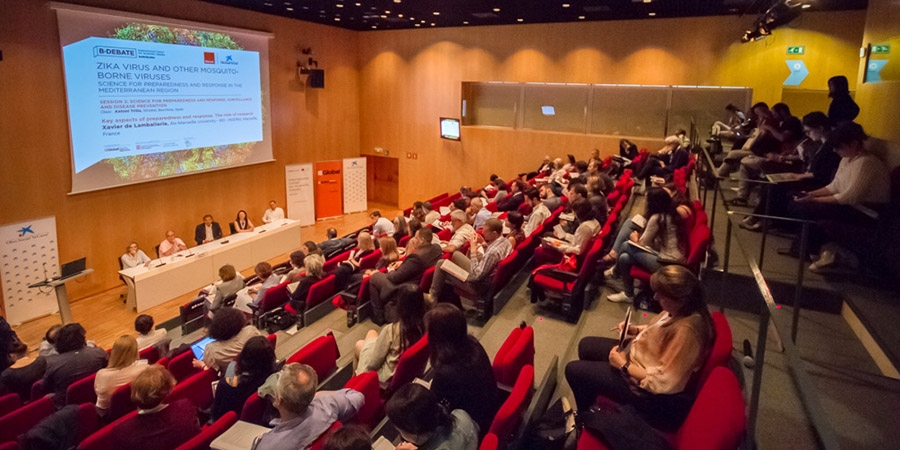Europe Must Strengthen its Preparedness to Mosquito-Borne Diseases
This is one of the conclusions of the B-debate on preparedness and response to Zika and other mosquito-borne viruses, coorganized by ISGobal
25.05.2017
The B-debate ‘Zika virus and other mosquito borne viruses: science for preparedness and response in the Mediteranean region’, organized by Biocat, the "la Caixa" Foundation and ISGlobal, with support from the Ramon Areces Foundation, took place at the CosmoCaixa, Barcelona, on May 23 and 24. During the brief welcome session, ISGlobal director Antoni Plasència pointed out that we need to be better prepared against viral threats, including the many yet unnamed viruses that are potentially pathogenic for humans.
Major vector borne diseases account for an estimated 17% of all infectious diseases, and the frequency and distribution of these diseases are changing under a changing climate. Thus, we have observed recent outbreaks in countries previously free from these diseases including the European region, where research and innovation are the cornerstone of successful public health strategies. These words, by Colleen Acosta, from the WHO, nicely introduced the goal of the B-debate, which seeks to identify research projects and platforms that can support Public Health capacities to prepare for and respond to mosquito-borne diseases, and strengthen the interaction between existing networks.
The first day sessions were dedicated to disease prevention and surveillance, clinical diagnosis and vaccines, and entomological and environmental drivers of arboviral infections. Laurence Marrama, from ECDC, underlined that in Europe we are likely only seeing the tip of the iceberg of mosquito-borne diseases, due to the high frequency of asymptomatic infections. Key messages from the lecturers included the need to increase Europe’s preparedness to emerging and re-emerging viruses (e.g. better diagnosis, risk mapping, and development of broad spectrum therapeutics) and the importance of integrated surveillance under a One Health approach, and the long road to vector control. Experiences in surveillance and control of Zika and other mosquito-borne diseases such as West Nile Virus were presented by different countries, including a dengue outbreak in Madeira, one of the only regions in Europe where the Aedes aegypti mosquito is present. Mireia Jané, subdirector of surveillance and response to public health emergencies (APSCAT), presented the surveillance and response plan to arboviral diseases in Catalonia. The day closed with the results from an assessment of the socioeconomic impact of the Zika epidemic in Latin America, performed by the UNDP in collaboration with ISGlobal and John Hopkins University.
The second day started with health economics of mosquito borne diseases, such as dengue, and the challenges associated to such studies. It was followed by a couple of interesting talks on social sciences, which stressed the importance of community engagement in the fight against these diseases. A nice example of citizen science for mosquito surveillance and control, the MosquitoAlert app, was discussed, as well as a global mosquito alert initiative launched recently in Geneva.
Throughout the two days, a series of existing networks and platforms to tackle different aspects of mosquito-borne diseases in Europe were presented, including surveillance (MediLabSecure), response (GloPID-R) , training (MediPIET), infrastructures for vector research (Infravec), vaccine development (EVI and Zikavax).
At the end of the B-debate, four workgroups discussed and presented major research tools and strategies that can contribute to improving public health preparedness and response to mosquito-borne diseases in Europe and the Mediterranean region. "This exercise will hopefully serve as basis for a meeting report to be published in the coming months", explains Pablo Martinez de Salazar, coordinator of arbovirus research at ISGlobal and scientific organizer of the event.



